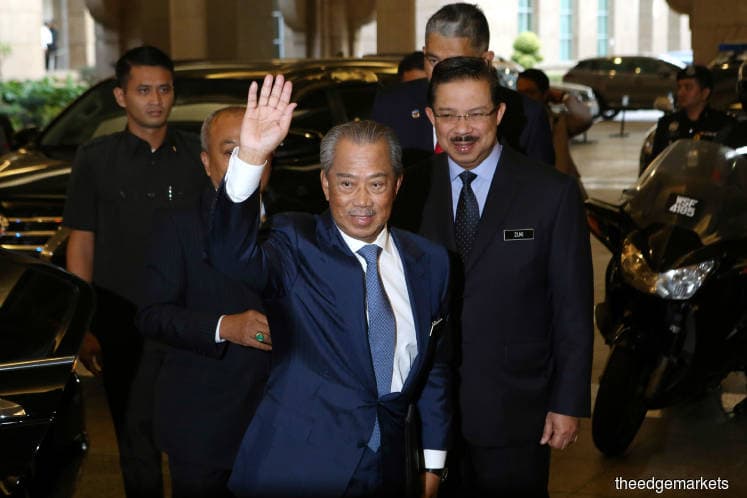
This article first appeared in The Edge Malaysia Weekly on May 25, 2020 - May 31, 2020
THERE is an illustration circulating on social media showing the number of seats purportedly held by the government and opposition in the Dewan Rakyat.
It says in bold: “111 vs 111, Snap election?” The people who created the graphic are saying that the government and the opposition are tied — and they are showing the maths to prove their point.
Let’s stick to the official version, but the fact that such a message is floating around says a lot about the current political climate in the country.
A quick recap of the official version. When members of parliament assembled last Monday for the Royal Address, the seating in the Dewan Rakyat showed that Prime Minister Tan Sri Muhyiddin Yassin commanded majority support.
The seating plan prepared by parliament staff indicated there were 114 MPs aligned with the government. However, Sri Aman MP Datuk Masir Kujat from Parti Sarawak Bersatu (PSB) came forward to clarify that he was wrongly assigned a seat on the government benches as he is in the opposition.
Thus, the number of government MPs is 113 while the opposition benches have 107 MPs. In between the two sides is Baru Bian — the independent MP for Selangau.
Therefore, Muhyiddin holds a wafer-thin majority of two. That is not reassuring for him and his Perikatan Nasional administration.
“The number actually suggests that Muhyiddin’s Achilles heel is not so much a possible motion of no confidence from the opposition, which could almost always be procedurally blocked in parliament, but the intent and ambitions of Umno leaders who, at any one time, may or may not continue to support him as leader of the ruling coalition,” says political commentator Dr Oh Ei Sun.
Earlier this month, it was reported that the Umno supreme council had rejected a proposal to formally join PN in order to safeguard the position and interests of the party. But note also that a memorandum of understanding to form PN was inked a day before last Monday’s one-day parliament sitting.
It was signed by BN, which Umno helms, Muhyiddin’s Bersatu, PAS (Umno’s partner in Muafakat Nasional), Gabungan Parti Sarawak or GPS, and two Sabah-based parties. But according to Umno’s Datuk Nur Jazlan Mohamad, “it is not binding, it is merely an MoU”. He also said the MoU is “just to show Muhyiddin has majority support”.
Also, some leaders of GPS are reported to be baffled over the MoU signed by party heads to affirm PN’s formation.
If comments by political activist Malek Hussin are anything to go by, the government has plenty to worry about. According to Malek, the seating plan is “just something on paper”. As he sees it, there are MPs placed on the government benches “who have not stated clearly whether they support the government or the opposition”.
For now, despite the slimmest of margins, Muhyiddin has the majority. But the real test will be in July when parliament is set to reconvene for 25 days and government bills will be debated.
The focus will surely be on former prime minister Tun Dr Mahathir Mohamad’s motion of no confidence against Muhyiddin. The possibility of an opposition motion being tabled can be said to be bleak. As Oh pointed out, it can be blocked through the use of procedures.
However, a no-confidence motion can take many forms.
“It does not have to be in formal motion form,” says constitutional expert Dr Aziz Bari. “It can appear in the legislative process, especially on major issues like the budget or Covid-19. If what is tabled by the government is rejected, then it has to resign,” he says.
To put it another way, failing to win a vote on any bill would mean Muhyiddin no longer commands majority support and he would have to step down with his entire government.
Muhyiddin will have to rely on Datuk Seri Azmin Ali in his capacity as government whip to ensure maximum attendance in the House lest government bills be defeated.
And he must count on MPs on the government benches being actually on his side even though their stand remains vague.
Perhaps it is time for an anti-hopping law, that is, a new federal legislation against defections by MPs. But this is nothing new. Back in the 1990s, the PAS government in Kelantan tried to ban party hopping. Long story short, the courts held that it was unconstitutional because Article 10 of the Constitution gives every person freedom of association.
In Penang, there has been an anti-hopping law in force since February 2013 as the Constitution of the State of Penang (Amendment) Enactment 2012 has already been gazetted. However, the enactment can still be challenged as the power to enact such a law is not stated in the Federal Constitution.
Legal experts say a state legislative assembly has no power to pass such a law.
The reality is only parliament can pass an anti-hopping law, that is, if it amends the Federal Constitution.
Now, there are calls for recall elections through which voters can remove elected leaders before their terms end if they change sides. Many are also clamouring for anti-hopping laws, especially after February’s political coup, followed by a series of takeovers in several states, with Kedah being the latest.
Will the federal government work towards enacting an anti-hopping law?
“I don’t think so as they need people from the other side to come over,” says Oh. But then, so does the opposition.
Mohsin Abdullah is a contributing editor at The Edge. He has covered politics for more than four decades.
Save by subscribing to us for your print and/or digital copy.
P/S: The Edge is also available on Apple's AppStore and Androids' Google Play.